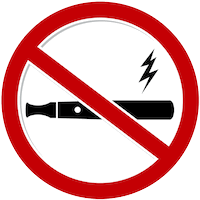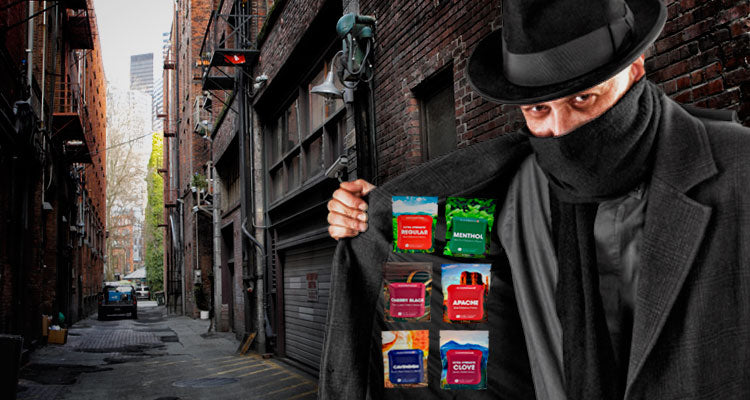As for the future of electronic cigarette regulations and tax policies in the United States, right now we can only speculate. But across the country, a vaping ban is on lots of people’s minds, essentially treating e-cigs as tobacco products. Politicians are calling for both e-cigarette bans and sin tax policies while the industry has to deal with a barrage of negative media scaremongering. Sin taxes are excise taxes, and they pay lots of state and local government bills. As cigarette sin taxes increase, smokers decrease, which means fewer sin tax dollars. Which also means a future hike in tobacco cigarette taxes. Again.
It’s easy to see where this will wind up if trends continue: In order to make any tax money, cigarettes will eventually cost more than a tank of gas. The goal, if the anti-tobacco folks are to be believed, is to make smoking be a thing of the past. But…what about the taxes? Enter: e-cigarettes.
Will Vape Bans & Taxes Create a Black Market?

If e-cigarettes are banned, or if they are sin taxed to the point of tobacco cigarettes, would vapers turn to the black market to find their vapes? Some data says, yes:, people would turn to the black market for e-cigs in the face of an vape ban. If this happens, will we start seeing the same massive problems with black market cigarettes that the country is seeing now? Or would it be more like prohibition, where e-liquids would replace bathtub gin?
Want to Ban Vaping? Speak Easy, Blind Tiger.

Ah, Prohibition. We look at it almost fondly now. The speakeasy – or the blind tiger or the blind pig – was both romantic and deliciously subversive. It looked so glamorously clandestine, with secret knocks, hidden entryways and slides to basement gin joints occupied by women like Hepburn and men like Barrymore drinking things called sidecars and highballs. There were underground catacombs and walls that hid liquor and a never-ending supply of homemade booze.
Everyone danced, the flapper was born, and the fear of getting caught just seemed to add to the fun. Plus, it was Prohibition that gave birth to what we now call NASCAR, so what a hoot, right? Awesome.
Except it wasn’t really awesome. Prohibition in the U.S. created some nasty problems. While police were arresting fewer drunken husbands, organized crime blossomed. The trade of illegal booze gave lots of bad guys the funding they needed to run lucrative illegal businesses.
Another problem? “Bathtub gin” was literally killing people. Many speakeasies and other secret saloons would take any alcohol they could get – the demand was never-ending, and those demanding it didn’t care much about quality, as long as they could get drunk. This meant that any Tom, Dick or Harry could mix up a bunch of whatever and sell it faster than they could make it. More than 1,000 people died each year during Prohibition due to tainted homemade liquor.
So, if flavored e-liquid is banned or seriously restricted – and we already know that many vapers would turn to the black market to get what they want – do we really want bathtub e-liquid as part of our history?
Related: Vaping Bans Across the US
Taxing the Sin Out of E-Cigs

We can now look back on Prohibition and clearly see where and how it all went completely wrong. But Prohibition didn’t end because people finally came to their senses. Prohibition ended because the Great Depression started, and the feds needed money. Enter: Sin taxes on booze.
Sin taxes are about as old as Adam and Eve’s great-grandparents. And despite each American’s natural, knee-jerk aversion to taxes, sin taxes are pretty easily accepted by most U.S. citizens. Extra taxes on gluttonous things like alcohol, gambling and cigarettes aren’t even that hated among those who consume them – especially when it comes to cigarettes.
Shaming tobacco smokers isn’t just okay, it’s encouraged. Many tobacco smokers carry the shame, and simply pay the continuous onslaught of new taxes on cigarettes. Eventually, it will get too expensive, the smoker will quit, and the sin taxes have to be raised again to account for fewer smokers.
Do you see how similar this is to a dog chasing his tail? Except this particular dog has issues and will eventually eat its own tail. So now the politicians and activists look at e-cigarettes with “ban” in their minds, tax dollar signs in their eyes and willful ignorance in their hearts. The demonization of vaping leads right back to the all mighty sin tax dollar.
Related: E-Cig Taxes: The Price is High
Big Taxes in The Big Apple Creating More Smokers

Tobacco sin taxes vary wildly from state to state, even city to city. The perfect example for sin taxes gone wild is New York. The combination of state-level sin taxes and additional New York City (NYC) sin taxes makes a pack of NYC tobacco cigarettes cost more than $12. This is why NYC became a petri dish for the cigarette black market. Smokers will pay a lot for a pack of cigarettes, but New Yorkers would love to pay less, even if it’s for illegal smokes. Right now, New York leads the country in smuggled cigarettes – a whopping 57 percent of cigarettes consumed in NYC are black market cigarettes.
The hiked taxes on cigarettes in New York state and NYC have ironically resulted in fewer people actually paying those taxes because they are very easily buying illegally smuggled cigarettes and, unlike most other places in the U.S., the number of tobacco cigarette smokers is rising. This is the opposite of what is good for the public for a number of reasons.
This should make policymakers think twice about a vaping ban and excessive taxation. Vapers could find themselves just going back to possibly illegally smuggled tobacco cigarettes or finding banned vapes on the black market. Good for public health? Not hardly.
Why Vape Bans & Sin Taxes Are Scary

Just like the scaremongering of sensationalist headlines calling for vaping bans, treating vaping like smoking and hiking e-cig tax prices will keep people from dropping tobacco and could also make them turn to cheaper, bootleg e-liquid. Much like during prohibition, vape bans will force folks to turn to products of questionable quality just to be able to afford e-cigs.
It’s a quandary that is difficult to even measure. Every person who would stay with tobacco because e-cigs would be taxed just as much or more fuels the tobacco industry. Every person who would buy vapor products of questionable quality are contributing to a black market and playing Russian roulette with their health while supporting a public health hazard.
There are approximately 42 million smokers and 20 million vapers in the U.S. today. A decade or so down the road, expect those numbers to flip. Though predicting the future is tricky business, without a vaping ban, experts expect e-cigarettes to overtake tobacco cigarettes by 2023. They expect tobacco cigarettes will account for only half of the revenue for the tobacco companies that have bought e-cigarette companies.
This prediction should be something to celebrate, but vape taxes and bans stall and complicate that prediction.
Gray is the New Black?

If some people have their way and e-cigarettes are piled with the same type of sin taxes that tobacco cigarettes now have – or if over-regulation would ban certain vape flavors or vaping systems – would that create a black market for vaping?
Yes…ish.
The problem with an outright ban is that it’s just not that easy. The word “e-cigarette” encompasses a huge range of nicotine vapor devices that all operate in the same basic way, but vary greatly. Every part you need to create “e-cigs” can be legally and easily bought separately. People are already mixing their own e-liquids – so are food additives going to be sin taxed because they are used in e-liquid?
Muddying the waters even more is that, since all of the ingredients that go into e-liquid are legal to buy and therefore taxed, it wouldn’t be a black market as much as it would be a gray market. If someone buys all of the taxed ingredients and then mixes his or her own e-liquid at home and not sell it, would that really be considered the black market? How would lawmakers sort through the gray area to clearly make that a crime? It’s not like we can just put all of the ingredients behind a pharmacy counter. (Because that has worked so well to stop the manufacturing of meth…) Plus, e-cig hardware is made from products the FDA cannot regulate – products that are taxed.
E-cigarette Taxes & Bans: Patience is a Virtue

While this is all still just speculation – the FDA hasn’t even announced their deeming regulations – it’s easy to see how the vaping industry could fall down the political rabbit hole if it’s treated the same as the tobacco industry, or if vaping devices and e-liquid are flat-out banned.
As an e-cig company, the answer is easy for us to see: sensible regulation. In addition to not selling to minors, we fully support being transparent with our ingredients, along with filling cartridges with e-liquid that is held to the highest possible standards.
Related: E-Cig Age Restrictions Laws in the US
Our hope is that the decision-makers are looking at history, and looking at the unbelievable stronghold black market tobacco has over cities like New York. Sensible regulation would help to elevate the vaping industry to even higher standards, not to mention keep things affordable enough so that the hundreds of small vape companies can compete with the handful that were recently bought by Big Tobacco. And so “bathtub e-liquid” never actually becomes a thing.






